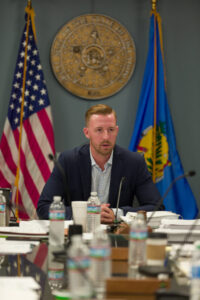Oklahoma Superintendent Unveils Guidelines For How To Teach The Bible In Schools
Annie Laurie Gaylor, co-president of the Freedom From Religion Foundation, said the guidelines are unconstitutional.

Get stories like this delivered straight to your inbox. Sign up for The 74 Newsletter
OKLAHOMA CITY – Oklahoma Superintendent Ryan Walters issued guidelines Wednesday for how teachers should include the Bible in public school curriculum that include requiring analysis of biblical stories and art.
And amid a growing swell of pushback from districts, he warned there would be consequences for school districts that don’t comply.
Grade-level specific guidelines apply to students in fifth through 12th grades. They require students to analyze literary elements of biblical stories and to identify how those have impacted Western culture. For high school students, it entails assigned essays on the Bible’s role in literature, history and culture. Pieces of art and music inspired by the Bible are also required to be taught.
Every classroom must also have a physical copy of the Bible, the United States Constitution, the Declaration of Independence and the Ten Commandments.
“The Bible is indispensable in understanding the development of Western civilization and American history,” Walters said in a statement. “To ensure our students are equipped to understand and contextualize our nation, its culture, and its founding, every student in Oklahoma will be taught the Bible in its historical, cultural, and literary context. As we implement these standards, our schools will maintain open communication with parents to make sure they are fully informed and full partners in their kids’ education.”
Walters announced the inclusion of the Bible in state curriculum during a June State Board of Education meeting, but Wednesday was the first time his agency announced specific guidelines regarding their inclusion.
In the weeks since Walters’ announcement, some of the state’s largest districts have said they will not comply.
Following the announcement, Rick Cobb, superintendent of Midwest City-Del City Public Schools, said in a statement that it is not appropriate to mandate the Bible to be in classrooms or instruction.
“The Oklahoma Supreme Court ruled this summer that selection of instructional materials is a matter of local control,” Cobb said. “I hope that remains the law and continues to be our practice.”

Walters said he will ensure all districts comply.
“Some Oklahoma educators have indicated they won’t follow the law and Oklahoma standards, so let me be clear: they will comply, and I will use every means to make sure of it,” he said.
Mixed reaction and questions about legality
The new guidelines drew mixed reactions.
Annie Laurie Gaylor, co-president of state-church watchdog group Freedom From Religion Foundation, said the guidelines are unconstitutional.
“It’s just absurd,” Gaylor said. “And he’s just signaling as fast as he can, as loud as he can, that he expects schools to brainwash children in the Christian religion.”
While the group is working with a coalition of other organizations to determine a plan of action, Gaylor said they are taking time to digest the material.
Gaylor said it would be appropriate for a properly trained teacher to offer an optional class to high school students on the Bible.
“But what he’s saying is every single teacher is to be given a Bible, and that’s just simply unconstitutional,” Gaylor said. “What about giving every teacher the Quran? What about giving every teacher Richard Dawkins’ blockbuster book, ‘The God Delusion’?”
Chuck Stetson, CEO of the NewYork-based Bible Literacy Project, said he commends the guidelines and wishes they would be implemented in every public school nationwide.
“This is educational instructions [to] the public schools, and it’s perfectly legal, and it’s what kids need to know,” Stetson said.
The organization provides textbooks on the Bible’s literature and influence. Stetson said the guidelines have similarities to the organization’s textbooks.
Not including the Bible in public schools disadvantages students, he said.
“For example, in Shakespeare, there are over 1,200 biblical references in the 38 plays of Shakespeare,” Stetson said. “My contention is that if you don’t know the Bible, you can’t possibly know Shakespeare and what he’s talking about.”
Stetson said the Bible is the “most-read literary book in the world,” and students miss out on literary and historical context when the Bible is not taught.
However, Stetson said he was unsure how the additions to curriculum could be implemented in lower grade levels.
Oklahoma Voice is part of States Newsroom, a nonprofit news network supported by grants and a coalition of donors as a 501c(3) public charity. Oklahoma Voice maintains editorial independence. Contact Editor Janelle Stecklein for questions: info@oklahomavoice.com. Follow Oklahoma Voice on Facebook and X.
Get stories like these delivered straight to your inbox. Sign up for The 74 Newsletter

;)